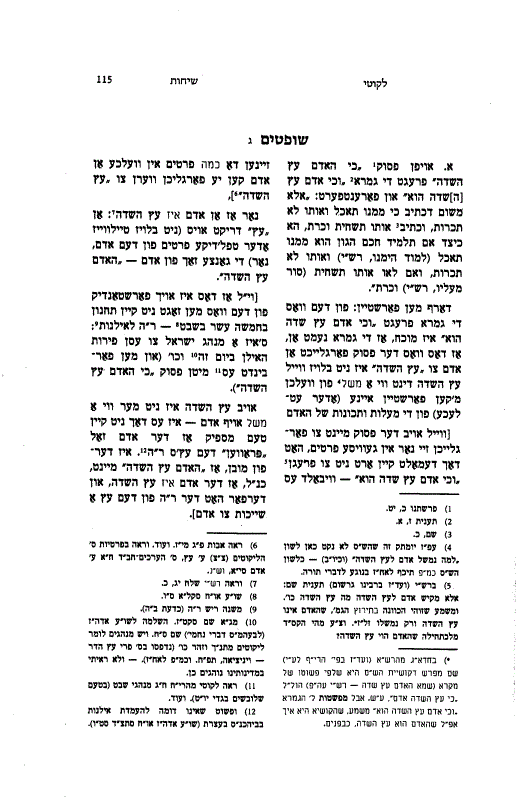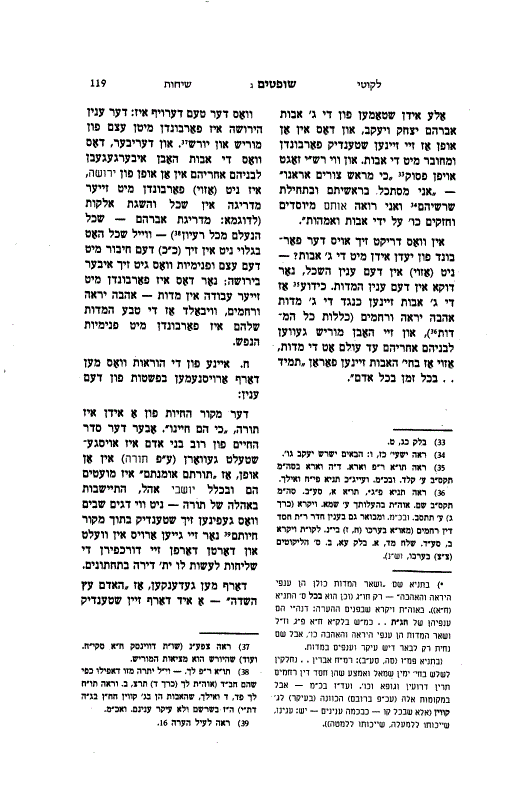Likutei Sichos vol. 24 – Shoftim 3
תוכן קצר:
השיחה דן בהשוואה בין האדם לעץ השדה, כפי שמובא בפסוק "כי האדם עץ השדה." הוא עוסק במעלות הצומח, הקשר שלו למקורו, ובקשר בין האדם למידותיו, המתקבעות בנפש פנימה כמו שורשי האילן באדמה. הפסוק מדגיש את הצורך בשלמות המידות, בדומה לחיבור האילן לאדמה, ומתמקד בחשיבות של תלמיד חכם הגון אשר ממנו ניתן ללמוד. כן נידון הקשר בין כלל ישראל להאבות, והמסקנה היא שהאדם, כמו העץ, חייב להיות מחובר למקורו הרוחני.
א) על הפסוק "כי האדם עץ השדה," מקשה הגמרא וכי אדם עץ השדה? ומתרצת שכמו שעץ מאכל אסור להשחית, כך ת"ח הגון - ממנו תאכל, ואילו עץ שאינו מאכל הוא כתלמיד חכם שאינו הגון. לפי זה, הדמיון בין אדם לעץ הוא רק במידה מסוימת. אבל מהקושיא של הגמרא משמע שהאדם בעצמו הוא כעץ השדה, ומטעם זה יום ראש השנה לאילנות הוא גם חג להאדם. לעומת זאת, תירוץ הגמרא מצמצם את ההשוואה להיבט מסוים בלבד, כאשר ההשוואה בין ת"ח הגון לעץ מאכל ולא לאדם כולו. ועוד, הרי מעלת האדם כוללת גם את החי והמדבר, ומדוע משווים אותו רק לאילן?
ב) מעלת הצומח מתבטאת בחיבור המתמיד שלו למקורו, שהוא האדמה, על ידי השורשים. אם עוקרים את הצומח מהאדמה, הוא מפסיק להיות צמוח. בשונה מזה, החי והמדבר אינם קשורים למקורם באופן דומה, למרות שהכול נברא מהאדמה. אף שבדגים יש קשר מסוים למקור חיותם, החידוש באילן הוא שלמרות גובהו מעל האדמה, הוא עדיין חייב להיות מחובר לאדמה לצורך קיומו.
ג) מעלת האילנות על פני שאר הצמחים היא בכך שהאילן יכול לסבול את כל שינויי השנה ולהמשיך לגדול, מה שמעיד על חיבור חזק למקור חיותו. לעומת זאת, צמחים אחרים שאינם נשארים כל השנה אינם מראים את אותו החיבור.
ד) האדם, בהיותו עולם קטן, מכיל בתוכו את הרוחניות של צומח וחי. המידות מקבילות לצומח שגדלים מקטנות לגדלות אבל נשארות במהותן ואינן משתנות ממדה למדה. השכל, לעומת זאת, מקביל לחי, שמשנה מקום ומצב בהתאם למצבים שונים, לפעמים בחסד ולפעמים בגבורה.
ה) כשם שהמעלה של הצומח על החי היא בחיבור המתמיד שלו למקור, כך גם המידות מחוברות לפנימיות הנפש. קשה לשנות את המידות משום שהן מחוברות לנפש, אף שניתן להתגבר עליהן בעזרת השכל. השינוי במידות דומה להעתקת עץ ממקום למקום בטירחא יתירה. לעומת זאת, השכל שבאדם, הדומה לחי, יכול לתפוס עניינים שהם הפך טבעו.
ו) לכן הפסוק אומר "כי האדם עץ השדה," כי בצומח שבאדם מתבטאת פנימיות הנפש. עיקר עבודת האדם היא שלמות המידות, שלאחר "וידעת" יבוא "והשבותה אל לבבך." תלמיד חכם השלם במידותיו הוא ת"ח הגון, וממנו אפשר ללמוד.
ז) כפי שהדבר נכון בפרטיות, כך הוא גם בכלל ישראל, שמחובר להאבות אברהם יצחק ויעקב, שהם המידות – אהבה, יראה ורחמים – שמורישים את עצמם לזרעם. בעיקר, הדבר מתבטא במידות ולא כל כך בשכל.
ח) ההוראה לכל היא שגם אלה שאינם "בעלי אוהל," עליהם לזכור שהאדם עץ השדה – צריך להיות מחובר למקורו. ויושבי אוהל צריכים לזכור שמתי דברי תורה חקוקים בנפשם – כאשר הםמתחברים לתורה ומבצעים את "והשבותה אל לבבך."
Short Summary:
The Sicha discusses the comparison between a person and a tree of the field, as stated in the verse "For man is a tree of the field." It explores the virtues of vegetation, its connection to its source, and the relationship between a person and their emotions, which are deeply rooted in the soul, much like a tree's roots in the ground. The verse emphasizes the need for the perfection of character traits, akin to the tree's connection to the earth, and highlights the importance of a righteous scholar from whom one can learn. It also addresses the connection between the people of Israel and the patriarchs, concluding that just as a tree must be connected to its source, so too must a person remain spiritually connected.
Translation of the Points:
A) The verse "For man is a tree of the field" is questioned by the Talmud, asking if man indeed is like a tree. The Talmud answers that just as a fruit tree should not be destroyed, so too a righteous scholar (Talmid Chacham) is likened to a fruit tree from which one may benefit. However, from the Talmud's question, it seems that man himself is like a tree, which is why the New Year for Trees (Tu Bishvat) is also a celebration for man. Yet, the Talmud’s answer limits the comparison only to a specific aspect—comparing a righteous scholar to a fruit tree, rather than man in general. Moreover, man has the additional qualities of animal and speech, so why is the comparison made only to a tree?
B) The virtue of vegetation is in its constant connection to its source—the earth—through its roots. If vegetation is uprooted from the ground, it is no longer a vegetation. In contrast, animals and humans are not connected to their source in the same way, even though everything was created from the earth. Although fish have a certain connection to their source of life, the novelty of a tree is that despite its height above the ground, it must remain connected to the earth to survive.
C) The advantage of trees over other plants is that trees can withstand all the changes of the year and continue to grow, indicating a strong connection to their source of life. Other plants that do not last throughout the year do not show the same connection.
D) Man, being a microcosm, contains within him the spirituality of both vegetation and animal. Emotions (middot) are analogous to vegetation, while they grow but they remain in their essence and do not change. In contrast, the intellect is analogous to the animal, which changes place and state, sometimes leaning towards kindness and sometimes towards severity.
E) Just as the superiority of vegetation over animals lies in its constant connection to its source, so too are the emotions connected to the inner soul. It is difficult to change one's emotions because they are connected to the soul, although one can overcome them with intellect. Changing emotions is akin to transplanting a tree from one place to another with great effort. In contrast, the intellect in man, similar to an animal, can grasp things that are contrary to its nature.
F) Therefore, the verse says "For man is a tree of the field," because the vegetation aspect in man reflects the inner soul. The primary task of a person is the perfection of character traits, so that after "you shall know," it will be followed by "and you shall bring it into your heart." A righteous scholar who is also complete in his character traits is one from whom one can learn.
G) Just as this applies to an individual, it also applies to the entire Jewish people, who are connected to the Patriarchs—Abraham, Isaac, and Jacob—who represent the emotions of love, fear, and compassion, and pass these on to their descendants. This connection is primarily in emotions, not so much in intellect.
H) The instruction for everyone, even those who are not "tent dwellers" (scholars), is to remember that man is a tree of the field—he must be connected to his source. And for those who dwell in tents (scholars), it is important to remember that the words of Torah are etched in their hearts when they remain connected to the Torah and bring it into their hearts.





